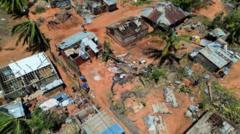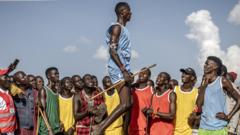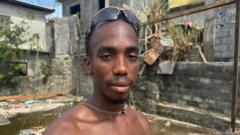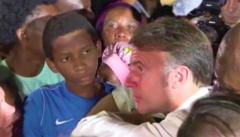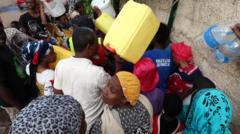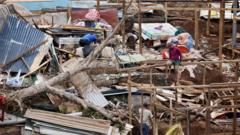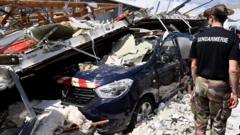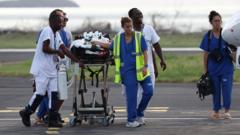The recent landfall of Tropical Cyclone Chido has wreaked havoc on Mayotte, leading to a humanitarian emergency in the French archipelago. As authorities grapple with the aftermath, a curfew has been instituted to maintain order amidst the chaos, while efforts to provide aid to the affected quickly ramp up.
Mayotte Enforces Curfew Following Devastating Cyclone, Hundreds Feared Dead

Mayotte Enforces Curfew Following Devastating Cyclone, Hundreds Feared Dead
French territory Mayotte faces a humanitarian crisis as authorities impose a curfew after Tropical Cyclone Chido.
On December 17, 2024, officials reported at least 22 confirmed fatalities from the destructive cyclone that struck with terrifying winds reaching 124 miles per hour. The storm left significant destruction in its wake, obliterating homes and entire neighborhoods in a region that is already classified as France's poorest territory. Eyewitness accounts reveal the devastation is widespread, with local leaders stating that hundreds, possibly thousands, could be dead, leading to concerns over an accurate death toll due to the high number of undocumented residents.
In response to this crisis, the French government enforced a curfew beginning at 10 p.m. to 4 a.m., with the hope of minimizing civil unrest. Thankfully, reports of looting and disorder remain limited, suggesting a level of community resilience amid the catastrophe. Nonetheless, thousands remain injured, and with a population of 320,000 on the islands, the challenges to reach all areas, including informal settlements, are considerable.
President Emmanuel Macron has announced plans to visit Mayotte shortly, indicating the government's commitment to addressing the crisis. Local leadership, such as Ambdilwahedou Soumaila, the mayor of Mamoudzou, highlighted how the cyclone's unexpected trajectory devastated communities that typically remain shielded by Madagascar. With rescue teams still working to evaluate the full extent of the damage, the islands are left reeling, navigating not only the immediate aftermath but the long-term recovery from such immense loss.
As aid efforts intensify, nations and organizations around the globe have been alerted to the dire situation, with flights already designated for relief supplies. Bottled water and food are being organized for transport to avert a growing crisis in basic necessities. The response from both national and international entities stands to play a crucial role in recovery efforts as Mayotte faces its greatest challenge in recent history.
In response to this crisis, the French government enforced a curfew beginning at 10 p.m. to 4 a.m., with the hope of minimizing civil unrest. Thankfully, reports of looting and disorder remain limited, suggesting a level of community resilience amid the catastrophe. Nonetheless, thousands remain injured, and with a population of 320,000 on the islands, the challenges to reach all areas, including informal settlements, are considerable.
President Emmanuel Macron has announced plans to visit Mayotte shortly, indicating the government's commitment to addressing the crisis. Local leadership, such as Ambdilwahedou Soumaila, the mayor of Mamoudzou, highlighted how the cyclone's unexpected trajectory devastated communities that typically remain shielded by Madagascar. With rescue teams still working to evaluate the full extent of the damage, the islands are left reeling, navigating not only the immediate aftermath but the long-term recovery from such immense loss.
As aid efforts intensify, nations and organizations around the globe have been alerted to the dire situation, with flights already designated for relief supplies. Bottled water and food are being organized for transport to avert a growing crisis in basic necessities. The response from both national and international entities stands to play a crucial role in recovery efforts as Mayotte faces its greatest challenge in recent history.


